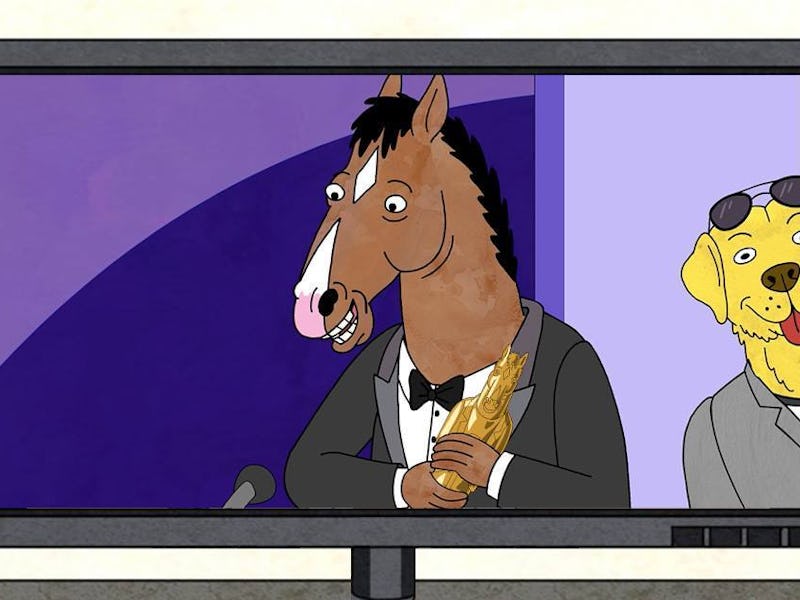The Inspiration Behind Netflix's BoJack Horseman
The very human actors who inspired the drug-fuelled, binge-drinking excesses of a talking horse.

The anthropomorphic protagonist of Netflix’s black comedy BoJack Horseman looks down upon the vast expanse of Los Angeles from his house atop the Hollywood Hills, and contemplates his wasted opportunities since he became a star. A ‘90s sitcom star to be exact. Across the 24 episodes released to date, BoJack and his friends take down the industry with razor-sharp precision. Their scathing brilliance is tinged with insider knowledge, leading us to deliberate just who exactly BoJack Horseman based on?
Creator Raphael Bob-Waksberg has denied that it’s about any one person. So let’s take a look at a few actors who could have inspired the hard-drinking horse.
Matthew Perry
Level of influence: A few hints
The Friends actor battled substance abuse for years, and recently confessed to having kept his drinking and drugging habits secret from his co-stars during production. They weren’t really secret though, were they? His drastic weight fluctuations between seasons were evidence of his on-off stints in rehab. Much like Perry, almost every flashback to BoJack’s glory days on set show him guzzling from a flask between takes, puffing away on endless joints, and popping pills. He can’t even frequent his local bar without getting hassled, another of Perry’s complaints.
David Duchovny
Level of influence: several major similarities
More specifically, Duchovny’s onscreen persona in Californication. The first season introduces us to Hank Moody, a literary god whose novel God Hates Us All is being adapted into a drippy Hollywood star vehicle. Tantrums are thrown and excuses tossed about with wild abandon as he endures a lengthy bout of writer’s block. A little like BoJack, who we first meet at the tail-end of a year-long carefree “summer” when he should have been scribbling out his memoir. Moody’s self-destructive behavior overlaps with much of BoJack’s; substance abuse, sex with inappropriately-aged women, procrastination and abandoning all responsibility to embark on impromptu road trips. Duchovny’s off-screen persona, in particular his battle with sex addiction, may have also influenced BoJack.
Dave Coulier
Level of influence: practically the same career path
The evidence supporting this theory is by far the most incriminating. BoJack’s family-friendly ‘80s sitcom Horsin’ Around ran for nine years, in which the boozy equine played a surrogate father to three children, whose domestic exploits fuel the hammy jokes and canned laughter. Think a blend of Who’s The Boss, Family Ties and Full House.
It’s was of course the latter that gave Dave Coulier his breakout role as wannabe comic Joey Gladstone, who BoJack’s creator calls “the unsung hero of that show. A stand-up comedian with an ocean of sadness running underneath his laughter. I don’t know if he invented the sad-clown archetype, but he certainly perfected it.” Coulier, along with his onscreen persona and BoJack, also hails from a stand-up background. And the ‘ocean of sadness’ metaphor? is Undoubtedly the lynchpin of BoJack’s character development across the two seasons.
One of the kids who Coulier took under his wing on Full House as their stand-in pop was Jodi Sweetin, who played the butter-wouldn’t-melt Stephanie Tanner. Sweetin’s career took a nosedive following the show’s end and she picked up a serious meth habit. Pretty much the exact same thing happens to one of BoJack’s former co-stars. In a callback to his past - a reminder of how his self-serving behavior affected his pint-sized colleagues - Sarah Lynn re-enters his life. A failed singing career transforms her into a parasitic, attention-seeking drug hoover. Coulier and Sweetin’s reunion was an attempted Curb Your Enthusiasm style web series called Can’t Get Arrested. Wonder whether the wrap party looked anything like this:
Oh, and Horsin’ Around aired between 1987-1996. Full House? From 1987-1995. Says it all.